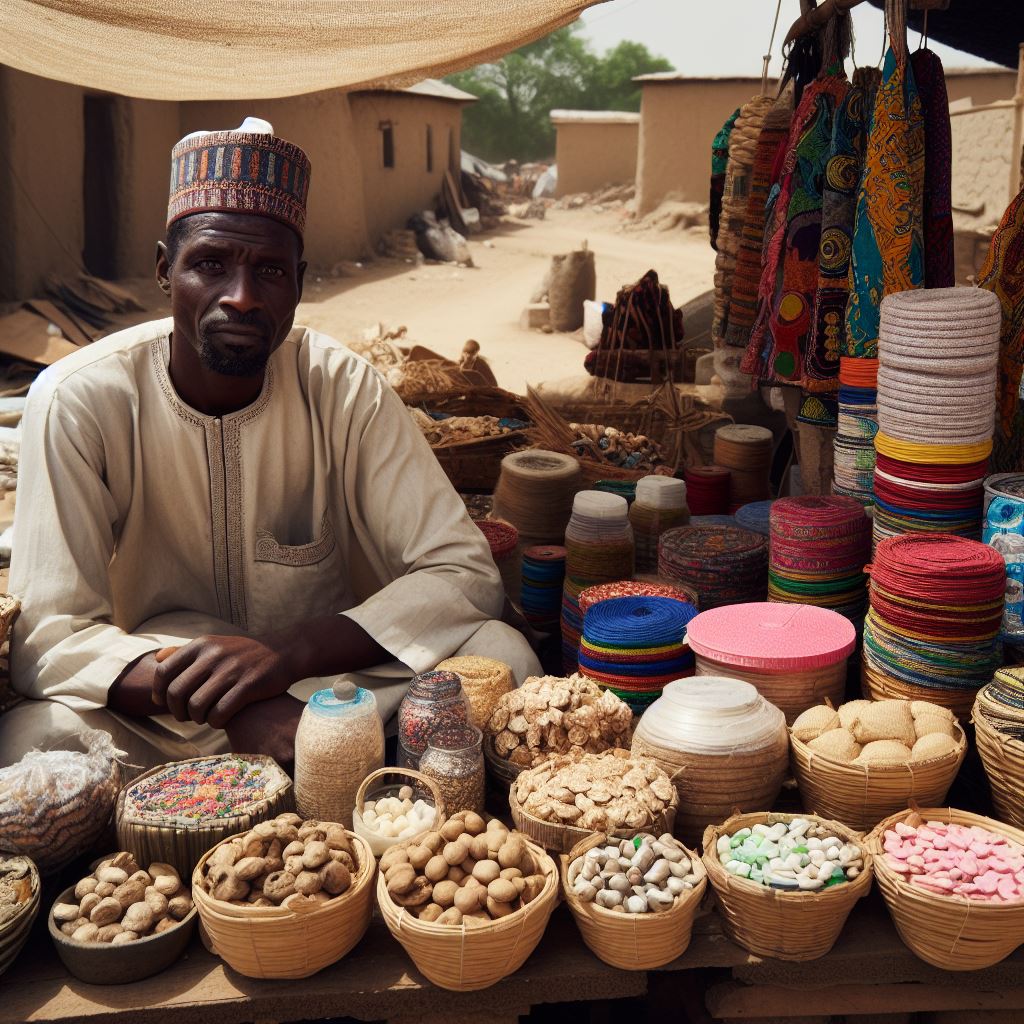Introduction
Nigerian rural economic studies delve into understanding the economic aspects of rural areas in Nigeria.
This field of study is dedicated to examining the economic conditions, challenges, and opportunities that exist within these regions.
By studying Nigerian rural economic studies, researchers aim to gain insights into the factors affecting the livelihoods, income generation, and development opportunities in rural Nigeria.
Fieldwork plays a crucial role in conducting research within rural areas.
It allows researchers to directly observe and interact with the local communities, gather primary data, and understand the intricate details of the economic landscape in these regions.
By immersing themselves in the rural setting, researchers can identify important nuances and factors that may not be apparent through secondary data sources alone.
In this blog post, we will explore how fieldwork is essential in Nigerian rural economic studies.
We will discuss the advantages of conducting research in rural areas, such as the opportunity to collect rich qualitative data and the potential for identifying context-specific solutions to rural development challenges.
Additionally, we will highlight some of the challenges and ethical considerations related to conducting fieldwork in such settings.
Through this post, readers will gain a deeper understanding of the significance of fieldwork in conducting research in Nigerian rural economic studies.
Purpose of Fieldwork in Nigerian Rural Economic Studies
Conducting fieldwork in Nigerian rural economic studies serves multifaceted purposes, transcending conventional data collection.
It’s a dynamic process encapsulating experiential learning and interaction.
Gathering First-Hand Data
Fieldwork is pivotal in Nigerian rural economic studies as it enables researchers to collect raw, unfiltered data directly from the communities under study.
Gathering firsthand data through interviews, surveys, and observations provides an authentic portrayal of rural economic landscapes.
This data, often unavailable through secondary sources, aids in generating comprehensive insights.
Transform Your Career with Expert Guidance
Get personalized mentorship consulting that’s tailored to your unique path. Our expert advice is actionable and exclusive.
Get StartedUnderstanding the Local Context and Challenges
It allows scholars to immerse themselves in the intricacies of rural life, comprehending the socio-economic challenges faced by these communities.
Understanding the local context is crucial. It unveils the interplay of social, cultural, and economic factors shaping rural livelihoods.
Researchers can identify bottlenecks and intricacies hindering progress.
Building Relationships with Local Communities
Engaging with locals fosters trust and facilitates a deeper understanding of their perspectives, cultures, and economic activities.
Building relationships with the community is more than data collection; it’s about mutual respect and understanding.
Establishing rapport ensures greater accuracy in interpreting collected data.
Identifying Opportunities and Potential Solutions
Fieldwork unveils opportunities for development and assists in crafting viable solutions tailored to rural realities.
Moreover, fieldwork serves as a platform for co-creation.
Collaborating with local stakeholders encourages shared solutions that resonate with the community’s needs.
Ultimately, fieldwork in Nigerian rural economic studies isn’t merely about academic inquiry; it’s about fostering sustainable development.
It aims to bridge the gap between theory and practical solutions, empowering rural communities towards economic prosperity.
By leveraging the rich tapestry of fieldwork experiences, researchers can drive meaningful change and innovation in the socio-economic landscape of rural Nigeria.
Read: How International Students Fare in Nigerian Tourism Courses
Preparation for Fieldwork
Preparing for fieldwork in Nigerian rural economic studies requires careful planning and execution.
Transform Your Ideas Into Impactful Words
Struggling to express your thoughts? Let us craft academic papers, articles, or blog posts that captivate, clarify, and connect with your audience.
Get StartedThis chapter focuses on key aspects, including research design and methodology, selection of study area and target population, obtaining necessary permits and approvals, and engaging local partners and stakeholders.
Research design and methodology
In terms of research design and methodology, it is crucial to clearly define the objectives of the study.
Developing a comprehensive research plan helps guide the entire fieldwork process.
Additionally, selecting appropriate research methods and designing the study framework are vital to ensure the collected data aligns with the research objectives.
Identification of variables and establishment of data collection techniques further contribute to the validity and reliability of the study.
Selection of study area and target population
Selecting the study area and target population is another critical step.
A thorough literature review assists in identifying suitable study areas and relevant populations for the research.
Consideration should be given to factors such as accessibility, availability of resources, and the compatibility of the chosen area with the research goals.
Determining the target population based on research objectives and sample size requirements helps in collecting representative data.
Obtaining necessary permits and approvals
Obtaining necessary permits and approvals is essential to ensure compliance with legal requirements.
Researchers must familiarize themselves with the specific regulations and ethical considerations of conducting fieldwork in Nigeria.
This includes acquiring ethical clearance and any other permits that may be required by governmental or institutional bodies.
It is crucial to follow the application process and submit all required documents within the specified timeline.
Engaging local partners and stakeholders
Engaging with local partners and stakeholders is crucial for successful fieldwork in Nigerian rural economic studies.
Make Your Study Abroad Dream a Reality
Need help navigating the complexities of studying overseas? Let us guide you through the application and visa process, ensuring a smooth journey to your dream destination.
Get StartedIdentifying relevant local organizations, government agencies, or community leaders is the first step.
Building partnerships with these entities helps gain support, cooperation, and access to resources and information.
Involving local stakeholders throughout the research process enhances community participation and ensures the data collected accurately represents the local context.
In fact, proper preparation for fieldwork is vital when conducting Nigerian rural economic studies.
This chapter discussed the importance of research design and methodology, selection of study area and target population, obtaining necessary permits and approvals, and engaging local partners and stakeholders.
By following these steps, researchers can ensure the validity and effectiveness of their fieldwork in gathering valuable insights into Nigeria’s rural economy.
Read: The Synergy of Culture & Home Economics in Nigeria
Fieldwork Challenges
Infrastructural limitations
During my fieldwork in Nigerian rural areas, one of the major challenges I encountered was infrastructural limitations.
Basic amenities such as electricity and reliable internet connection were often unavailable, making data collection difficult.
The lack of proper roads and transportation systems also hindered my ability to reach remote villages and gather data effectively.
These infrastructural limitations not only affected the efficiency of my fieldwork but also impacted the overall quality of data collected.
Despite these challenges, I employed innovative methods such as using solar-powered equipment and mobile data collection tools to overcome some of the infrastructure limitations.
Language and cultural barriers
Another significant challenge during my fieldwork in Nigerian rural areas was the language and cultural barriers.
Many rural communities in Nigeria have their own local dialects, which made effective communication and data collection challenging.
Unlock the Full Potential of Your Research
Stuck in your academic research? Whether it’s data analysis, research design, or literature reviews, we offer expert guidance to elevate your work and ensure success.
Get HelpTo address this issue, I recruited local translators who helped me communicate with the rural population and gather accurate data.
Understanding the cultural nuances and traditions also played a crucial role in building trust and rapport with the communities.
Overall, language and cultural barriers required careful planning and integration of local resources to ensure successful fieldwork.
Security concerns
Working in Nigerian rural areas also posed security concerns during my fieldwork.
Instances of petty theft, hostility, and even armed conflicts in some regions added an additional layer of challenge to my research.
To mitigate these concerns, I collaborated with local authorities and community leaders to ensure my safety and establish a peaceful research environment.
Implementing proper safety measures, such as traveling in groups and avoiding high-risk areas, was crucial to carrying out successful fieldwork.
Despite the security challenges, the insights gained from studying the Nigerian rural economy made it a worthwhile endeavor.
Logistics and transportation difficulties
Lastly, logistics and transportation difficulties presented considerable challenges during my fieldwork.
The lack of affordable and reliable transportation options made it challenging to move between different rural areas.
Often, I had to rely on shared taxis, motorcycles, or even long walks to reach remote villages for data collection.
Additionally, the lack of proper accommodation in rural areas required careful planning and coordination to ensure a comfortable stay during fieldwork.
Despite these difficulties, the determination to collect valuable data motivated me to find alternative solutions and successfully complete my fieldwork.
Fieldwork Experiences and Learnings
In the pursuit of conducting rural economic studies in Nigeria, fieldwork experiences play a crucial role.
This post explores the various aspects of fieldwork experiences and the lessons learned along the way.
Immersion in the local community
To truly understand the socio-economic dynamics of rural Nigeria, it was essential to immerse ourselves in the local community.
- Cultural insights and appreciation: By spending time living among the locals, we gained valuable cultural insights and developed a deeper appreciation for their traditions and way of life.
- Establishing trust and rapport: Building trust and rapport with the community members was a vital step towards gaining their cooperation and finding success in our research endeavors.
Data collection methods and techniques
Accurate data collection is the foundation of any economic study.
In Nigeria’s rural areas, we employed various methods and techniques to gather information effectively.
- Surveys and interviews: Structured surveys and interviews provided us with quantitative and qualitative data, allowing us to understand the economic challenges and opportunities in the community.
- Observation and participant observation: Through direct observation and participant observation, we were able to witness economic activities firsthand and gain a deeper understanding of daily routines and practices.
- Focus group discussions: Engaging in focus group discussions gave us a platform to explore specific economic themes with a group of community members, fostering a rich exchange of ideas and opinions.
Overcoming challenges encountered during fieldwork
Fieldwork presents numerous challenges, especially in rural settings.
We encountered several obstacles and had to find innovative solutions to continue our research effectively.
- Adapting to limited resources: Rural areas often lack infrastructure and resources. We had to adapt and find creative ways to work with limited means, ensuring our research was not compromised.
- Communicating effectively despite language barriers: Language barriers posed a significant communication challenge.
We had to leverage local translators and develop non-verbal communication techniques to bridge the gap effectively. - Ensuring personal safety: Working in unfamiliar territories requires proper safety measures.
We prioritized personal safety by taking precautions, seeking local advice, and being aware of the surroundings. - Innovations in logistics management: Navigating rural areas in Nigeria demanded innovative logistics management.
We relied on technology and local knowledge to optimize transportation and overcome logistical hurdles.
In short, conducting fieldwork in Nigerian rural areas provided us with valuable experiences and lessons.
Immersion in the local community, utilization of various data collection methods, and overcoming challenges contributed to our successful research endeavors.
These experiences broadened our perspectives and deepened our understanding of rural economies, paving the way for meaningful insights in our study.
Read: The Role of Culture in Nigeria’s Hospitality Curriculum

Findings and Insights from Fieldwork
Unique economic activities in Nigerian rural areas
The fieldwork revealed a diverse range of economic activities in Nigerian rural areas.
These activities include farming, livestock rearing, handicrafts, and small-scale manufacturing.
Local communities engage in these economic activities to generate income and sustain their livelihoods.
These economic activities are often deeply rooted in the traditional knowledge and skills of the rural communities.
Rural areas possess unique resources and natural endowments that shape their economic activities.
For example, communities near rivers and lakes engage in fishing as a primary economic activity.
The diversity of economic activities showcases the resilience and adaptability of rural communities.
Factors influencing economic development in rural communities
The fieldwork identified various factors that influence economic development in Nigerian rural communities.
Access to basic infrastructure such as roads, electricity, and clean water is crucial for economic growth.
Education and skills training play a significant role in enhancing economic opportunities in rural areas.
The presence of social networks and community organizations fosters entrepreneurship and innovation.
Government policies and regulations, when supportive, can stimulate economic development in rural areas.
Market access and connectivity, both within Nigeria and internationally, are vital for economic growth.
Gender equality and women’s empowerment contribute to the economic development of rural communities.
Impact of government policies and programs
The research findings highlighted the impact of government policies and programs on rural economic development.
Effective government interventions can create an enabling environment for rural economic growth.
Investments in infrastructure, education, healthcare, and agriculture are essential to drive economic development.
Government programs that promote entrepreneurship and provide financial support are beneficial.
However, ineffective implementation and corruption can hinder the impact of government policies.
There is a need for transparent and accountable governance to ensure the success of rural economic programs.
Potential areas for intervention and improvement
The fieldwork provided valuable insights into potential areas for intervention and improvement in rural economic development.
Improving access to credit and financial services can empower rural entrepreneurs and stimulate growth.
Investments in infrastructure, particularly transportation, can enhance market linkages and trade opportunities.
Enhancing vocational training programs can equip rural communities with skills for diverse economic activities.
Encouraging the use of modern technologies can enhance productivity and efficiency of rural economic activities.
Developing value chains and promoting agribusiness can unlock the potential of agricultural resources in rural areas.
Furthermore, addressing social inequalities and promoting social inclusion can contribute to sustainable economic development.
Read: Success Stories: Nigerian Home Economics Graduates
Recommendations based on Fieldwork Experiences
Enhancing access to basic infrastructure
- Improve road networks to connect rural areas with urban centers, facilitating trade and access to markets.
- Increase investment in reliable electricity and water supply, essential for agricultural and economic activities.
- Develop and maintain healthcare facilities in rural areas to improve access to quality medical services.
- Expand internet connectivity to bridge the digital divide and enable access to online resources and markets.
Improving education and vocational training opportunities
- Establish more schools and improve existing ones to ensure quality education for rural children.
- Provide vocational training programs tailored to the needs of the local economy.
- Increase teacher training and incentives to attract and retain qualified educators in rural areas.
- Promote adult education programs to enhance the skills and knowledge of the rural population.
Supporting entrepreneurship and local businesses
- Provide financial support and incentives for rural entrepreneurs to start or expand their businesses.
- Develop microfinance programs targeted at rural communities to facilitate access to credit.
- Promote value-added agricultural activities such as processing and packaging to increase income opportunities.
- Facilitate market linkages and provide business training to enhance the competitiveness of local enterprises.
Strengthening collaboration between researchers, policymakers, and communities
- Foster partnerships between researchers and local communities to ensure research addresses their needs.
- Promote knowledge sharing platforms, such as workshops and conferences, to facilitate collaboration.
- Involve policymakers in the research process to ensure findings are effectively translated into policies.
- Establish mechanisms for continuous feedback and evaluation to enhance the impact of research on rural development.
In general, based on fieldwork experiences in Nigerian rural economic studies, several recommendations can be made to address the challenges faced by these communities.
Enhancing access to basic infrastructure, improving education and vocational training opportunities, supporting entrepreneurship and local businesses, and strengthening collaboration between researchers, policymakers, and communities are crucial for sustainable rural development in Nigeria.
By implementing these recommendations, the economic and social conditions of rural areas can be improved, leading to inclusive growth and poverty reduction.
Conclusion
Fieldwork in Nigerian rural economic studies epitomizes proactive research, catalyzing tangible progress.
It encapsulates the vitality of firsthand immersion, deciphering multifaceted rural economies.
The significance of fieldwork extends beyond textbooks, breathing life into theories.
In essence, it unravels hidden nuances, fostering a holistic comprehension.
Throughout our explorations, key findings emerged, unveiling pivotal economic intricacies.
We uncovered the resilience and resourcefulness ingrained within rural communities.
Moreover, the symbiotic relationship between agriculture and local economies surfaced prominently.
Understanding these dynamics is pivotal for formulating targeted developmental strategies.
The call to action echoes loud and clear—further research and interventions are imperative.
It’s paramount to initiate sustainable programs catering to the unique needs of rural areas.
Empowering local entrepreneurs and enhancing agricultural practices stand as crucial interventions.
Moreover, infrastructural advancements are pivotal to propel rural economic growth comprehensively.
This clarion call beckons policymakers, researchers, and philanthropists to collaborate synergistically.
It urges the academia to delve deeper, seeking comprehensive solutions and innovative interventions.
Fieldwork in Nigerian rural economic studies isn’t merely a chapter; it’s a continuum.
It’s an ongoing saga of learning, intervention, and transformational progress.
Its significance cannot be overstated—direct involvement sparks impactful change.
So, let’s heed this clarion call, bridge the gaps, and illuminate the path toward rural prosperity.
Fieldwork isn’t just a phase; it’s a catalyst for sustainable rural economic evolution.
This marks the culmination of our exploration—yet, it’s just the beginning of transformative action.




